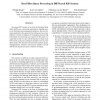ISPA
2005
Springer
14 years 11 months ago
2005
Springer
Abstract. With the help of distributed hash tables, the structured peerto-peer system has a short routing path and good extensibility. However, the mismatch between the overlay and...
ESORICS
2005
Springer
14 years 11 months ago
2005
Springer
Distributed Hash Tables (DHTs) are very efficient distributed systems for routing, but at the same time vulnerable to disruptive nodes. Designers of such systems want them used in ...
SIGCOMM
2005
ACM
14 years 11 months ago
2005
ACM
Recent research has shown that one can use Distributed Hash Tables (DHTs) to build scalable, robust and efficient applications. One question that is often left unanswered is that ...
ICDE
2005
IEEE
14 years 11 months ago
2005
IEEE
Structured P2P systems in the form of distributed hash tables (DHT) are a promising approach for building massively distributed data management platforms. However, for many applic...
SAINT
2006
IEEE
14 years 11 months ago
2006
IEEE
Despite the scalability, availability and resiliency potential suggested by Distributed Hash Tables, their lack of support for replication of mutable data and for strong consisten...
P2P
2006
IEEE
14 years 11 months ago
2006
IEEE
For the use in the Internet domain, distributed hash tables (DHTs) have proven to be an efficient and scalable approach to distributed content storage and access. In this paper, ...
NCA
2006
IEEE
14 years 11 months ago
2006
IEEE
Distributed Hash Tables (DHTs) provide a scalable mechanism for mapping identifiers to socket addresses. As each peer in the network can initiate lookup requests, a DHT has to pr...
LCN
2006
IEEE
14 years 11 months ago
2006
IEEE
Structured Peer-to-Peer systems are designed for a highly scalable, self organizing, and efficient lookup for data. The key space of the so-called Distributed Hash Tables (DHTs) ...
ISCC
2006
IEEE
14 years 11 months ago
2006
IEEE
Most research on Distributed Hash Tables (DHTs) assumes ephemeral, lightly loaded deployments. Each node has a lifetime of a few hours and initiates a lookup once every few second...
IEEEARES
2006
IEEE
14 years 11 months ago
2006
IEEE
Distributed hash tables (DHTs) can be used as the basis of a resilient lookup service in unstable environments: local routing tables are updated to reflected changes in the netwo...



